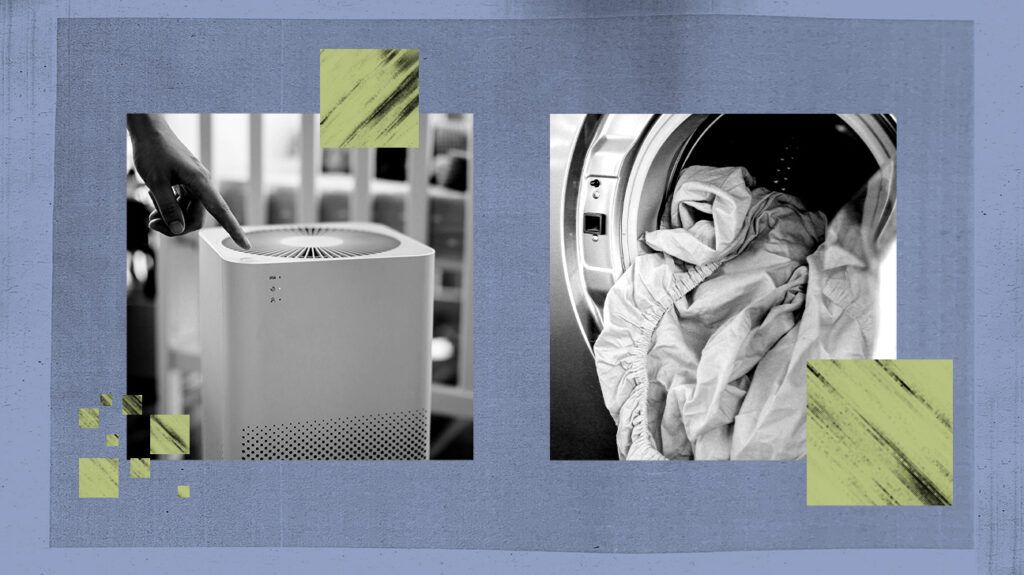Home remedies and taking allergy medication in the evening may help ease hay fever symptoms at night and improve sleep.
Hay fever symptoms, such as congestion, may make it more difficult to sleep at night.
This article looks at tips for managing hay fever at night to help with sleep and when to contact a doctor.

Some people may experience worsened hay fever symptoms at night. Indoor allergens in the bedroom may cause hay fever symptoms, such as dust, pet dander, or pollen entering from outside.
Due to the body’s natural rhythms, the severity of allergy symptoms may fluctuate throughout the day and night.
The circadian rhythm refers to the 24-hour biological clock, which responds to factors such as light, dark, and hormones.
This rhythm affects many processes in the body, including immunity and how the body responds to medication.
Hay fever symptoms may worsen at different points in this 24-hour cycle, with symptoms becoming more severe between midnight and the morning.
Anecdotal reports also suggest lying down may worsen nasal congestion, which may aggravate hay fever symptoms at night.
Air purifiers help clean the air and remove indoor allergens or irritants. They trap small particles, such as pollen, pet dander, and mold.
People can place an air purifier in the bedroom or use a filter that works throughout the whole house. Experts recommend air purifiers with the following characteristics:
- If using an air purifier in a single room, choose one with a high-efficiency particulate air (HEPA) filter with a clean air delivery rate (CADR) matching the size of the room it will be in.
- If people have a central heating, ventilation, and air conditioning (HVAC) system, they can install a permanent or disposable air filter to purify air throughout the home.
- If installing a filter into the HVAC system, a disposable filter with a minimum efficiency reporting value (MERV) rating between 11 and 13 may be the most cost-efficient option.
- The higher the MERV rating on a filter, the greater its effectiveness.
- People will generally need to replace a disposable filter every 3 months.
The Asthma and Allergy Foundation of America (AAFA) recommends the following tips for keeping allergens out of the bedroom:
- washing bedding weekly at 130°F (54.4°C) and drying on a hot, dry cycle
- vacuuming mattresses weekly
- considering hard flooring instead of carpet or vacuuming the carpet weekly to help prevent dust mites
- using a vacuum certified to remove allergens
- avoiding wearing clothes and shoes in the bedroom that people have worn outside
- showering before going to bed
- keeping pets out of the bedroom
- closing bedroom windows during high pollen counts or high pollution levels
- avoiding heavy furnishings, which can collect dust or other airborne allergens
Taking allergy medication in the evening may help relieve symptoms at night and help people sleep better.
Allergy medications, such as antihistamines, can cause drowsiness as a side effect. The drowsy effects of the medication may also help people sleep better and help avoid daytime drowsiness.
In some cases, drowsiness may last longer than people expect. Some individuals may also experience vivid dreams with certain antihistamines.
Using anti-allergy bedding can help reduce exposure to indoor allergens. A person can use allergen-proof covers for all bedding, including:
- pillows
- duvets
- comforters
- mattresses
- box springs
People can also ensure to replace their pillows every 2 years and mattresses every 10 years to help prevent the buildup of allergens.
Nasal strips attach over the nose to widen the nostrils and increase the amount of airflow. This may be beneficial for those experiencing hay fever symptoms such as congestion.
A
Elevating the head while sleeping may help people breathe easier and reduce postnasal drip.
Individuals may want to try using extra pillows or elevating the head of the bed with 6-inch blocks.
Steam inhalation may help loosen mucus in the nose and help moisten and clear the nasal passages. This may relieve hay fever symptoms, ease breathing, and aid sleep.
If people want to try steam inhalation, they can take a hot shower before bed and breathe in the steam through their nose.
In some cases, certain foods that contain proteins similar to pollen may trigger a reaction in people with hay fever.
If a person notices that certain foods cause a reaction or worsen hay fever symptoms, it may be best to avoid consuming them before bed.
Staying well hydrated may help thin mucus and postnasal drip and ease congestion. People can try to drink plenty of fluids throughout the day and evening.
If home remedies are not effectively managing hay fever at night, people can speak with a doctor.
Not getting enough sleep may affect other aspects of health, so if hay fever hinders sleep, it is important to seek treatment.
Healthcare professionals can discuss a treatment plan, which may include over-the-counter medication, prescription medication, or lifestyle changes.
Hay fever symptoms may worsen at night due to the body’s natural rhythms, lying down, or allergens in the bedroom.
Reducing exposure to indoor allergens, taking allergy medication before bed, and home remedies such as steam inhalation may all help ease symptoms and improve sleep.
If home remedies do not help ease hay fever symptoms at night, people can consult a doctor for further treatment.


